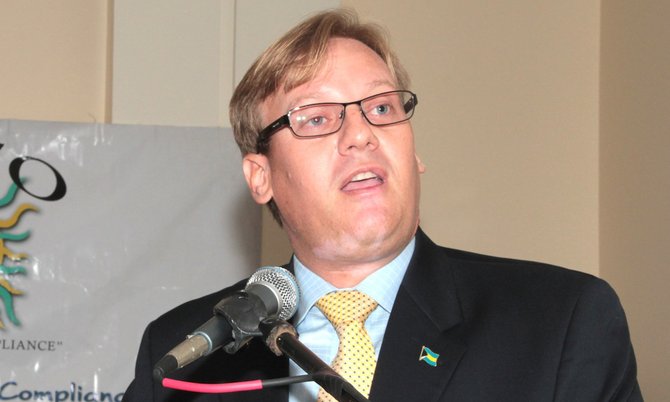
Nassau, Bahamas – Remarks by Hon. L. Ryan Pinder, Minister Of Financial Services on the Occasion of the Nassau Conference delivered on 22nd October, 2014— “A Policy Perspective, Engaging In A Transparent World”:
Ladies and Gentlemen,
It is indeed a pleasure for me to address you today at the Nassau Conference presented by the Association of International Banks and Trust Companies in the Bahamas. For the third year in a row, the Ministry of Financial Services has agreed to be the lead sponsor of The Nassau Conference. We choose to do so for a few reasons. We certainly view The Nassau Conference as an event that promotes continuing investment in education of financial services professionals. We also are pleased, for a third year in a row, to partner with AIBT to advance one of the initiatives I am most proud of, the provision of opportunities in the financial services industry for students at the College of the Bahamas seeking to develop their careers, much like many of you have done.
Today we have students from the College of the Bahamas who have been given the opportunity to attend the Nassau Conference at no cost. Students, please identify yourselves. Secondly, my partnership with AIBT has allowed for a summer internship program to be offered to COB students at institutions in the financial services field. This year we have expanded this to include law students as well, for reasons I will go into a bit later. These real world experiences for future professionals in our industry is invaluable to their professional development. This partnership between AIBT and my Ministry has made a lasting impression on the lives of young Bahamian students.
The theme of this presentation, and the conference perfectly captures the momentum, and many would say the concerns of the day. We at the Ministry of Financial Services have given the positioning of the Bahamas and the industry in a transparent world primary focus. This is the most important issue to financial centers today. We are pleased to be ahead of the curve, in our thinking and in our response to the world ensuring at a number of different levels, both internationally and domestically, that we are engaging in a transparent world, setting the stage for growth in a transparent world.
Overview of Global Rules in Transparency
A significant challenge to the financial services industry are the mandates by multilateral institutions such as the Organization for Economic Development and Cooperation (OECD), International Monetary Fund (IMF), the Financial Action Task Force (FATF), the Global Forum, the International Organization of Securities Commissions (IOSCO), The European Union, and the United States through its Foreign Account Tax Compliance Act. Each of these have made efforts to impose on jurisdictions’ regulatory and policy requirements to develop a standard for international best practices in transparency, in other words, these multilateral institutions have in concert set the rules of the game in transparency of financial services. The ability to comply and properly implement such systems, while maintaining and environment for growth, will preserve the integrity of a particular jurisdiction as a financial center.
It is not without challenge, however, to both the financial services industry as well as financial center jurisdictions. I would suspect that complying with these multi-faceted regulatory standards that define the global arena of transparency are a challenge for all jurisdictions worldwide. The main topic of conversation and discussion when the future of the financial services industry is referred to has to do with the progression towards and acceptance of a global standard for automatic information exchange.
Under the single global standard released in February jurisdictions obtain information from their financial institutions and automatically exchange that information with other jurisdictions on an annual basis. It sets out the financial information to be exchanged, the financial institutions that need to report, the different types of accounts and taxpayers covered, as well as common due diligence procedures. The intent is to implement this global automatic regime through negotiated bilateral agreements.
Not only has the standard now been released, the international community is now looking for a commitment from all countries as to the standard by the next Global Forum meeting at the end of this month. Although this appears to be the mandate, there is also the sometime forceful suggestion that countries agree to and sign the Convention on Mutual Administrative Assistance in Tax Matters, which is a multilateral convention that appears to require, at least for some countries, and particularly the Bahamas, obligations that are difficult if not impossible to implement on a multi-country basis. In the face of these demands, what can a country like the Bahamas do to ensure, as I said above, that as a financial center we are positioned for not only compliance with the new international rules, but positioned for growth and sustainability. I am of the opinion that this can only happen through engaging in this new transparent world, engaging at all different levels.
Engagement with International Organizations
A key element of success for a financial center is sustained engagement in the forum of where and how these initiatives are developed. Through sustained engagement as a financial center you can advance initiatives favorable to your industry development. It would be naïve to believe that engagement can stop an international initiative, however I think it logical and likely that sustained development can cause for the method of implementation of international initiatives to be done in a way that is favorable to your industry, and cause for a financial center to create additional opportunities for growth. And although I support direct and fact based engagement, engagement should not be combative nor confrontational. The end goal of sustained engagement should be to ensure the voice of the jurisdictions that are doing business in the otherwise threatened environment is heard. The Bahamas through sustained engagement has demonstrated success for industry, and through sustained engagement in the OECD process we will advocate for opportunity and benefits for the country in implementation.
An example of accomplishment through sustained engagement can be found in the Bahamas’ negotiations with the United States on matters related to FATCA and our IGA. Last year we identified what we described as an unintended consequence of the FATCA regulations that had serious ramifications to what might be one of our most significant businesses in financial services, trust administration. The regulations were interpreted to cause for trusts who had a commercial trustee to have to be registered as a FFI with the United States regardless if it had a US interest. Having identified this, we presented our case on a sustained manner based in law and logic to the United States authorities. We argued that it went beyond the scope of FATCA, was creating a form of trust registry which was not endorsed, and potentially put at risk thousands of our clients whose businesses, families and lives might be threatened in their home jurisdictions if their holdings were made public. Based on engagement and logical argument, the United States agreed and we negotiated a sponsored trust exemption into the schedule of the IGA. This was a significant achievement for our industry, a direct result of sustained engagement on an international initiative.
The Bahamas is committed to having sustained and direct engagement on the development and implementation of the OECD standard on automatic exchange of financial account information, we believe we can formulate and advance positions that will provide opportunity through its implementation. We are active participants in the Global Forum Committee on Automatic Exchange of Information. We are likewise members of The Committee of Experts on International Cooperation in Tax Matters. The Bahamas has advocated the position of international financial centers at a meeting of technical experts of the G20 on this issue. The Bahamas has also engaged at the diplomatic level to encourage our partners who are members of the G20 and OECD to advance our advocacy.
We have clear positions that we advocate for and present in the context of the global standard for automatic exchange of information and how it should be implemented. We believe that the method of implementation utilizing the multilateral convention is flawed. An example of this is the spontaneous exchange of information when you believe structures of transactions are being initiated for tax avoidance purposes. It is impossible for a financial center to be able to have the capacity to identify for over a hundred different tax systems and laws what might be a transaction for tax avoidance purposes.
We agree with the proposition that automatic exchange arrangements should be negotiated through bilateral agreements. We believe that being a signatory of a multilateral framework is the decision of the country, and not of the international organizations, that the method of implementation of an agreed standard is that of the individual country.
Another opportunity where I think sustained engagement can have positive effect on industry is the formulation of the guidance and interpretation of the OECD guidance:
“Before entering into a reciprocal agreement to exchange information automatically with another country, it is essential that the receiving country has the legal framework and administrative capacity and processes in place to ensure the confidentiality of the of the information received and that such information is only used for the purposes specified in the instrument. Where this is not the case, automatic exchange is not “appropriate”.
This concern lies in the fact that there are unintended consequences to a transparent world. There are issues that are completely unrelated to taxation that come into play when transparency and automatic exchange are advanced. These include the risk to the personal safety of our clients and their families and businesses. We in the Bahamas realize this more than others, as we have re-focused our industry in Latin America, in countries where many practitioners would say that the risk to personal safety of clients is real, and that a transparency agenda brings these concerns to the forefront.
We believe that an objective case can be made for many or our key markets that this clause on confidentiality and use of information would apply, resulting in a lack of an OECD mandate for an automatic exchange agreement with these countries. In fact, to make the case that this clause would apply is fundamental to the survivability of a legitimate financial center serving the Latin American market. In the context of financial services, financial centers like the Bahamas would best be able to help formulate this guidance. We believe that the determination of confidential use of information and used for its intended purpose can also change within a country depending on a political regime. What will be the criteria for this determination, how will it be accepted, will it be able to change depending on political regime. These positions can only be formulated in your favor through sustained engagement.
Likewise, what would be the alternatives if automatic exchange with these countries was “not appropriate”? Certainly these countries are not going to merely accept that they are outside the entire scope of these international initiatives. Does this re-open the debate between automatic exchange of information and a regime of anonymous withholding and reporting? We think it just might, however, it can only be the case through sustained engagement. The Bahamas sees value and opportunity through sustained engagement on international initiatives, we have created an international initiatives unit within the Ministry of Financial Services, the Bahamas will have sustained engagement. You can only advance these types of reforms and methods of application if you are at the table, if you have sustained engagement.
Private Public Engagement on Industry Position
One of the most critical factors to the sustainability and progressiveness of the Bahamian financial services industry is the importance of the compelling public private partnership in The Bahamas. It ensures that the long-term proposition of The Bahamas is protected. The Bahamas Government recognizes the importance of the private sector as the engine of growth for the sector. The private sector is a partner in national development, and the advancement of the financial services industry. Engagement with the private sector in a transparent world will allow for public policy to be developed to position the industry for growth and sustainability.
In The Bahamas this is a mutually beneficial relationship – private sector has influence and ability to shape business friendly policies. Public sector benefits from the experience of industry and is able to make policy decisions using the best information available to it as opposed to guessing. The engine of cooperation is hard at work in The Bahamas and this also extends to the regulatory environment as well. This is where partnerships between the Ministry of Financial Services and industry groups such as AIBT and BFSB are fundamental. This partnership extends beyond domestic private sector, in practice the partnership is inclusive of international private sector participants.
A direct result of the innovation from private public partnerships is the development of annual and permanent residency programs of The Bahamas, inclusive of residency programs that support tax certificates. This is particularly important to ensure reliable, definitive rights to live and do business in The Bahamas.
If you want to live or have the right to live in The Bahamas there are many options to become a resident. Annual residence requires no minimum investment but just an application. Annual residency can be requested for up to 5 years and allows for you to lawfully live in The Bahamas without investment. The second option – permanent residence allows you to permanently reside in The Bahamas with a minimum investment in a home of US$500,000. This is a very popular option to clients looking to have a residence option that is permanent and a 35-minute flight to Florida in the United States of America, without the tax consequences of living in the United States, or having a Green Card.
There is also an option that allows you seek permanent residence and have the right to work in your own business from within the Bahamas, linking the business interest of the client, with the desire to have a component of their business interest in The Bahamas, and the right to live lawfully with no restriction. This is a particularly innovative option for the entrepreneur with a global reach, one who wants a base to access the western hemisphere, one that wants a tax neutral, sophisticated platform to operate, one who wants the platform of The Bahamas, an entrepreneur looking for business expansion globally, and a jurisdiction that can manage their wealth in a safe and secure environment. In conclusion – The Bahamas offers options for your business, your wealth and your life with a deep infrastructure of dedicated professionals to serve you.
These options and frameworks for residency options are particularly important in the context of the previous discussion on formulating an approach to a global standard of automatic exchange of information. Through engagement with industry through public private partnerships the development of the industry is happening here in the Bahamas, private sector engagement in a transparent world.
New Product Development through Engagement
In a transparent world, it is fundamental that a financial and business center continues to evolve, continues to be innovative and offer new opportunities for clients. Industry and Government policy in financial services and the offerings of industry must adapt to the new transparent world. More emphasis must be on substance, credibility, and legitimate and lawful planning means. More focus must be paid to specific needs of markets and clients, and to react accordingly in a timely and nimble fashion. This is done through engagement both domestically and internationally with practitioners and the clients themselves to best understand the specific planning needs. The Bahamas has done just this in recent years, adjusting to a changing transparent environment, being innovative with product development as a result of multi-national engagement.
The new product launched this year, the investment condominium, or ICON, is an example of this. The ICON is an example of The Bahamas’ consistency and commitment with respect to its clients and is indicative not only of where The Bahamas is positioned now in the investment funds sector, but also of its aspirations to be the preeminent hub for funds and asset management to the Americas and beyond. The ICON is a product of the collaborative and progressive approach to the development of new legislation in The Bahamas, a direct result of widespread engagement.
This is only the latest example of modernization and innovation of our financial services industry through engagement. Preceding this innovation was SMART Fund model 007, a fund product, although with a wide range of applicability, designed for the Brazilian market, a fund product modeled after the Brazilian super qualified fund.
We likewise recognize through engagement with our industry that a platform for asset managers, family offices, and investment advisory firms is needed in a changing environment of transparency. A platform where substance and physical presence can be created. In response to this engagement, and recognizing a new opportunity in an evolving industry, we have committed to a facilitative policy platform to attract this business, through streamlined permanent residency programs focused on ability to work in your own business, through a consultative and streamlined regulatory environment, and an appreciation from Government investment policy that these types of businesses should likewise attract a stream lined approach to Government approvals. In a transparent world, physical presence operations, diversified operations are necessary and part of the evolution through engagement.
Engaging the Industry in Human Capital Development
A jurisdiction and industry can have all of the methods of engagement in this new transparent world I have discussed, however, if you do not have the people to cause for all of these to function, both by Government and industry, then you are still vulnerable as an industry and do not offer your clients the best product and service, and ultimately vulnerable to survival. The domestic professionals in the industry are the true gatekeepers of the integrity of its financial operations, something we in The Bahamas take considerable pride in, and as a Government and an industry, take an approach of engagement in this transparent world to ensure that we have the human capital to address the changing needs of industry.
To ensure that our industry has the capacity to protect itself, while maintaining growth, we in The Bahamas have an absolute commitment to training and education. An industry is only as good as its professionals, and we claim to be leaders in preparing our professionals to be leaders in the industry. An example of this is The Bahamas Institute of Financial Services. The Bahamas Institute of Financial Services is a financial services institute with more than 30 years of education with internationally accredited programs. The Bahamas has had a long history of developing its domestic financial services talent and professionals, ensuring we have the best gatekeepers of our industry and the best persons to provide you with the services that are necessary for your clients.
We must identify skills gaps in this evolving transparent world and create programs to fill them with our professionals. My Ministry, the Ministry of Financial Services in partnership with the Bahamas Institute of Financial Services, prepared two international accredited certification programs in Taxation and Corporate Finance to ensure our professionals had capacity in areas where we foresee the industry developing. Ensuring the domestic professionals exist is imperative to ensuring a jurisdiction is a successful diversified business and financial center in an evolving industry. It is our belief that it is important commit to developing a platform of education and training, so as a whole our human capital is stronger and better prepared.
I would like to take an opportunity in this regard to speak to the college students and aspiring and young professionals in the room. In an evolving industry, one where new concepts and rules are being developed for our jurisdiction, we need further engagement with you and the educational institutions to provide a platform for specialization and exposure to current trends in the industry. For example, we need more tax policy and technical tax courses in both the College of the Bahamas, and maybe more importantly, in the law school. Taxation is not only becoming important, but is fundamental to the development of the industry. There are maybe 2 or 3 tax attorneys in all of the Bahamas for example. An area of specialty that you should consider. As the industry develops, new areas of expertise and specialty will be in demand. The Government of the Bahamas is committed to engagement with educational institutions to provide the framework for these evolving specialties.
We need a legal profession to devote itself to the refinement of specialty practices, especially in the industry of financial services. The evolution of the industry requires the necessary expertise in areas such as taxation, complex structuring, securities and complex trust drafting. Unfortunately, in many of these developing niche areas, our bar currently does not have the adequate capacity to meet the needs of the clients and the evolving industry. Capacity might develop if the lawyers investing themselves and their expertise, however, the industry demands expertise now in order to meet the challenges of an evolving landscape.
I propose that it is time we consider allowing foreign law firms with the necessary expertise to enter and operate from within the Bahamas in the financial services industry. We can do it in a fashion where entrepreneurial opportunities and knowledge transfer is extended to Bahamian attorneys. Not only will this allow us to meet the demands of industry, transfer knowledge in expertise areas to Bahamian practitioners, and further entrepreneurial opportunities in partnership with select foreign law firms, it will immediately result in an increase in business for the industry as a whole. Allow me to explain how I reach this conclusion.
I will give you an example of my recent trip to China and Hong Kong. In Asia, the British Virgin Islands in the number one financial center. This isn’t because there is anything unique about the BVI, in fact, I put forward that the Bahamas has more diverse offerings in both products and services. A primary reason why BVI is so popular in Asia is because the international law firms are in Hong Kong and BVI, and they refer business between their offices. We in the Bahamas do not have that luxury. More internationally diverse law firms in the Bahamas I propose will result in more business in the Bahamas. This policy shift will only come about through engagement with the legal professionals, especially in this new transparent world where new expertise is required, and new business can be developed.
We in the Bahamas have to take engagement between the financial services industry and supporting professions to ensure not only that we have the products and services to succeed in a transparent world, but that we have the professional network and expertise to ensure the business properly follows to our jurisdiction, a jurisdiction that many of us will say is best positioned for growth and development in this new transparent world. This engagement is not going to be easy, not going to be straight forward, but it is professional level engagement that is required for growth. We can all come out ahead with a properly structured professional services network worldwide, that supports growth and entrepreneurism to Bahamian practitioners.
Conclusion
This evolving transparent environment and its impact on financial services industries, and international financial centers is an intimidating reality. It is intimidating to industry participants, intimidating to clients, and yes, at times can be intimidating to Governments. But I am of the firm belief that engagement at all levels, in the international environment, in the international private sector, the domestic private sector, with governments will produce an environment of differentiation, an environment of sustainability, and an environment of growth. Yes, we do not make the rules, we do not enforce the rules, but we have an ability to effect how the rules are implemented and the positioning of our jurisdiction and industry in the scope of the rules.
But it is not only important for governments to engage, it is fundamental that the private sector commitment themselves to engagement to define the way forward in what seems a shifting set of rules. We have the intelligence and capacity to do it, we need the focus that is required. Engagement is not an easy process, many times it seems that it is an uphill battle with groups where you are overmatched, but engagement is necessary, actually fundamental. The Bahamas believes in engagement at all levels, the Bahamas will develop that platform of success and growth in what seems a difficult and evolving environment. I challenge all of you here, the private sector, regulators, and certainly me as the representative of the government to keep engagement at the forefront.







